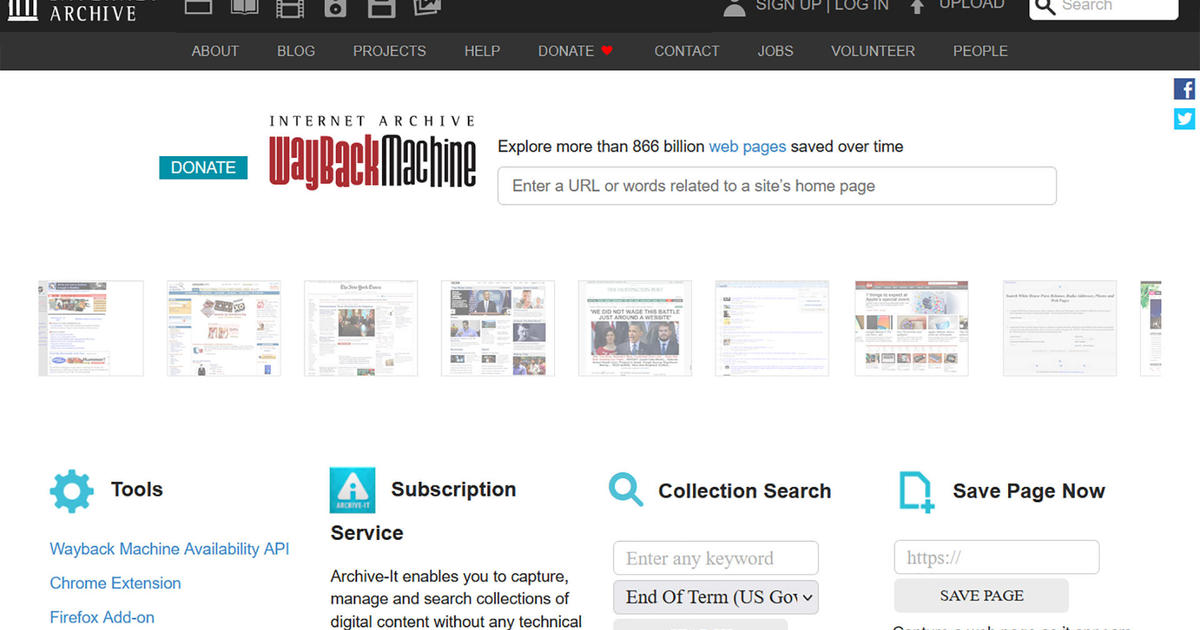David Samuel performs viola within the San Francisco-based Alexander Quartet. However he virtually did not make it into this nation. “I am a Canadian citizen,” he stated, “and I subsequently wanted a piece visa if I used to be coming to the US.”
That artist’s visa required particular documentation: “I used to be tasked with discovering outdated applications, articles, interviews, something that would display that I had contributed considerably to the sphere,” he stated. Sadly, most of that stuff had disappeared from the web over time.
Then, somebody steered he try the Web Archive’s Wayback Machine. Samuel wound up discovering each live performance program, interview and article he wanted for his visa.
The Wayback Machine has been making backups of the world vast net since 1996. Mark Graham, its director, describes it as “a time machine for the online. It does that by going and webpages, tons of of hundreds of thousands of them each single day proper now, and shops them in our servers.”
Thus far there are practically 900 billion net pages backed up, although pc scientist Brewster Kahle thinks it is a merciless joke to name them “pages” contemplating their brief lifespan: “The typical lifetime of a webpage is 100 days earlier than it is modified or deleted,” he stated.
CBS Information
About 1,000,000 folks use the Wayback Machine every single day – journalists, fact-checkers, politicians, policymakers, college students. It is free and public. By going to archive.org, you’ll be able to see what The New York Occasions regarded like in 1996, or what Netflix regarded like when it was a DVD-by-mail firm, or what private web sites (like, say, davidpogue.com) regarded like again within the day.
Kahle created the Wayback Machine in 1996, as a part of a nonprofit known as the Web Archive. Contained in the archive’s San Francisco headquarters, initially a Christian Science Church, you will discover the unique pews, barely creepy statues of everybody who’s ever labored for the Web Archive, and banks and banks and banks of computer systems – about one-twentieth of the servers that make up only one copy of the Web Archive. “After which there are a number of copies to maintain it protected,” Kahle stated.
However Kahle needs to again up extra than simply the online; he needs to again up the whole lot. “Can we get the entire revealed works of humankind out there to anyone curious sufficient to have entry to it?” he requested.
He is backing up outdated music, like copies of 78 rpm information … and outdated video video games (MD-DOS classics like Oregon Path, Prince of Persia, and an early Pac-Man), outdated TV exhibits (“We’ve, perhaps, the world’s largest VCR!” Kahle laughed) … and books. And the whole lot Kahle backs up, he makes free on-line – even the obscure stuff, like classic recreation exhibits, knitting magazines, and pet rock manuals.
You’ll be able to even try the books he is scanned as if from a library.
And that is the place the difficulty begins.
E book publishers determined to sue Web Archive over lending books. Music publishers are additionally suing, for $400 million. Kahle says in the event that they win these circumstances, it might imply the top of the Web Archive.
The Affiliation of American Publishers declined an interview with “CBS Sunday Morning,” however wrote to us: “There’s merely no authorized justification for copying hundreds of thousands of copyrighted books, altering them into eBooks, and distributing them to the general public, all with out getting permission.”
However to Kahle, it is a battle of excellent and evil. He says the publishers’ eventual purpose is to cease public libraries from proudly owning something in any respect. “We’ll see the way it all seems; it is being fought out within the courts,” he stated.
The publishers received their lawsuit in opposition to Kahle’s operation; he is filed an enchantment. The report corporations’ lawsuit is pending.
In happier information, violist David Samuel obtained his inexperienced card in September, thanks partly to the supplies he discovered on the Wayback Machine.
CBS Information
For more information:
Story produced by David Rothman, Editor: Emanuele Secci.
